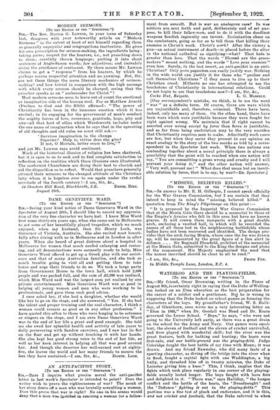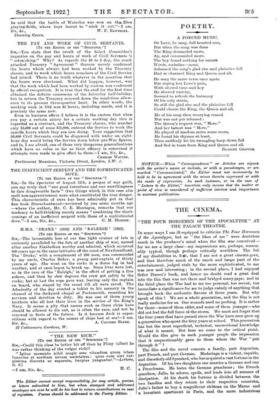WATERLOO AND THE PLAYING FIELDS.
[To THE EDITOR OP THE " SPECTATOR."3 Sin,—My friend, Oscar Browning, writing in the Times of August 9th, is certainly right in saying that theDuke of Welling- ton looked on an Eton education as the best preparation for the career of a soldier and a gentleman. But he is wrong in supposing that the Duke looked on school games as forming the characters of the boys. My grandfather's friend, W. S. Halli- day,.of Glenthorn, once wrote me a very interesting letter on "Eton in 1805," when Dr. Goodall was Head and Dr. Keate governed the Lower School. " Boys," he says, " who were not going to the University left early, as there was a great drain on the school for the Army and Navy. Our games were excel? lent, the eleven of football and the eleven of cricket unrivalled, and fives played with wonderful skill; but the river was the great feature, both for bathing and boating; the boats were first-rate, and our battle-ground was the playing-field. Judge Coleridge fought the best battle of my time with Mann; it was drawn. And my friend Rawnsley, who did many feats of a sporting character, as diving off the bridge into the river when in flood, fought a capital fight with one Waddington, a big bully, and thrashed him oft in twenty minutes, the Duke of Leinster giving him a knee." This, I think, implies that the fights which took place regularly in one corner of the playing- fields usually lasted longer. The boys fought with bare fists and delighted in it. " There was," says Halliday, " the bangee conflict and the battle of the boats, the `Dreadnought' and the ' Defiance' fighting it out in the playing-fields." This pastime was a fine test of pluck and endurance, and it is this, and not cricket and football, that the Duke referred to when
he said that the battle of Waterloo was won on theuEton playing-fields, where boys learnt to " stick it out."—I am,



































 Previous page
Previous page